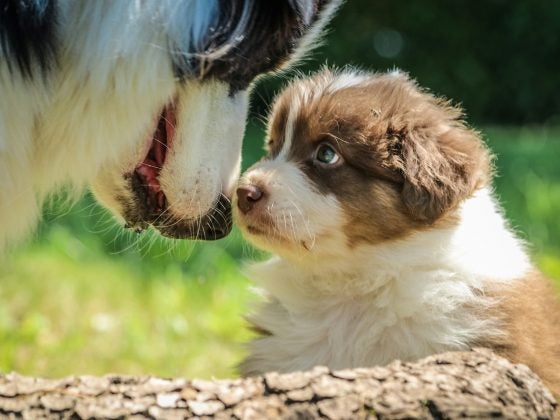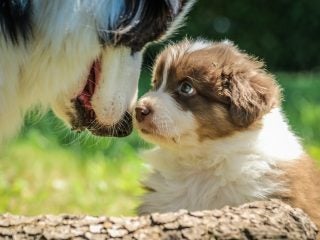Our dogs have a language all of their own, and one of their most expressive behaviours all owners would have experienced is licking.
From a gentle lick of your hand or an enthusiastic face licking, dogs use this to communicate a variety of messages and emotions. So, when a dog does lick you, what does it mean?
Understanding why your furry friend engages in this behaviour will help you work out their emotional and physical well-being. Licking can signify affection, curiosity, stress, and more, so below, you’ll find some of the most common reasons for licking and what your dog is trying to communicate with you.
Whether you enjoy this aspect of dog ownership or try to avoid a sloppy kiss from your canine as much as possible, remember that it is a natural behaviour and completely normal. Once you know more about why they do it, you’ll be able to respond appropriately and build a stronger bond with them.
To Express Affection
We love our dogs as a nation, so it’s nice to know that they also appreciate being looked after. One of the most heartwarming reasons a dog may lick people is to express affection for this very reason. This is rooted from a young age as puppies lick their mothers’ faces and mouths as a gesture of love and to prompt that they want feeding. As dogs grow, they carry this behaviour into their interactions with humans.
When your dog licks you, it’s often their way of showing not just attention (more on this below) but love. Similar to the way you may kiss your dog on the head to say hello or with members of your family, it can be your dog’s way of showing trust. This affectionate type of licking is generally soft and slow, indicating the dog’s relaxed and happy state in your presence.
They Are Seeking Attention
As well as showing love, many dogs will use licking as a way to get our attention. When they start doing this, they may want more than just a pat on the head or cuddle, but to play or indicate they might be hungry. When they do so, take note of the way you react – if they get a positive response from you like a stroke under the chin or an enthusiastic “good boy/girl!”, they’ll remember this and will want to seek this out.
Be mindful of positive reinforcement that rewards your dog for good behaviour like treats and praise when they are licking for attention. Consistently rewarding this can encourage your dog to lick even more, so to avoid excessive licking, it can be best to ignore them, or if you can, anticipate they are going to do it and distract them with a toy before they do.
They Are Experiencing Stress or Anxiety
It may seem like a dog’s life is full of fun and games, but it can sometimes be stressful. Licking can be a sign of this, whether it’s licking themselves or you. Think about what you may do when feeling anxious, such as biting your nails or tapping a foot – licking is your dog’s way of soothing themselves, so they may lick themselves or objects excessively when feeling anxious or uncertain to help them feel more relaxed.
You might notice this behaviour at certain times, such as when there are loud noises outside including fireworks or loud thunder, or even when taken to different environments they are not used to, such as a friend or family member’s house. Anything that may cause their stress levels to go up can trigger this type of licking.
It can also indicate that something else is wrong. As per the Kennel Club, your dog may lick more frequently if they have a health issue such as an allergy, injury or arthritis. If you notice they are licking themselves a lot in one area, such as their paw or their rear end, have a look to see if there is a visible issue. If there is a sign of injury or a problem, you’ll want to speak to your vet for more advice.
They Like The Taste & Want To Explore
For some dogs, licking can just be a sign they really like the taste of something, and it helps when they are looking to explore an environment. If you notice your dog is licking your hands, arms or face, it could be they are exploring a body lotion or moisturiser you’ve used, or if you’ve been sweating after a workout or run – this can all be very interesting for your dog!
A dog’s sense of taste is enhanced by their strong sense of smell, making licking a primary way to explore new tastes and textures. Whether it’s a drop of ice cream on the floor or a new type of fabric on the furniture, dogs use their tongues to investigate and experience their world. Puppies, for example, will do this to learn about their environment as lots of things will be new to them. While generally harmless, you’ll want to keep an eye on what your dog is licking off the floor or when out for a walk to avoid them ingesting harmful substances.
Communication With Other Dogs
Between dogs, licking is a great form of communication. They may sniff or lick other dogs as a gesture of submission or to initiate play. Licking a dog’s muzzle can signal a greeting or an attempt to say sorry if they have a minor disagreement. They may also be grooming the other dog, which is generally a good sign they are getting on if the other dog is happy with this.
Keep An Eye On Your Dog’s Licking Behaviour
As there are many different reasons your dog may lick you, themselves, other dogs or their surroundings, being able to spot these signs will help you know when you’ll need to do something. While sometimes it is just a simple display of affection, it can also indicate more complex emotional states such as anxiety, desire for attention, or even underlying health issues.
Whether it’s reinforcing positive behaviour, addressing the potential causes of stress for your dog, or seeking help from your vet if you notice something unusual or different, being vigilant will help you care for them in the best way. Remember, if their licking becomes too much and you’re not sure what to do, a dog behaviourist may be able to help as well as your vet, so don’t hesitate to ask.












